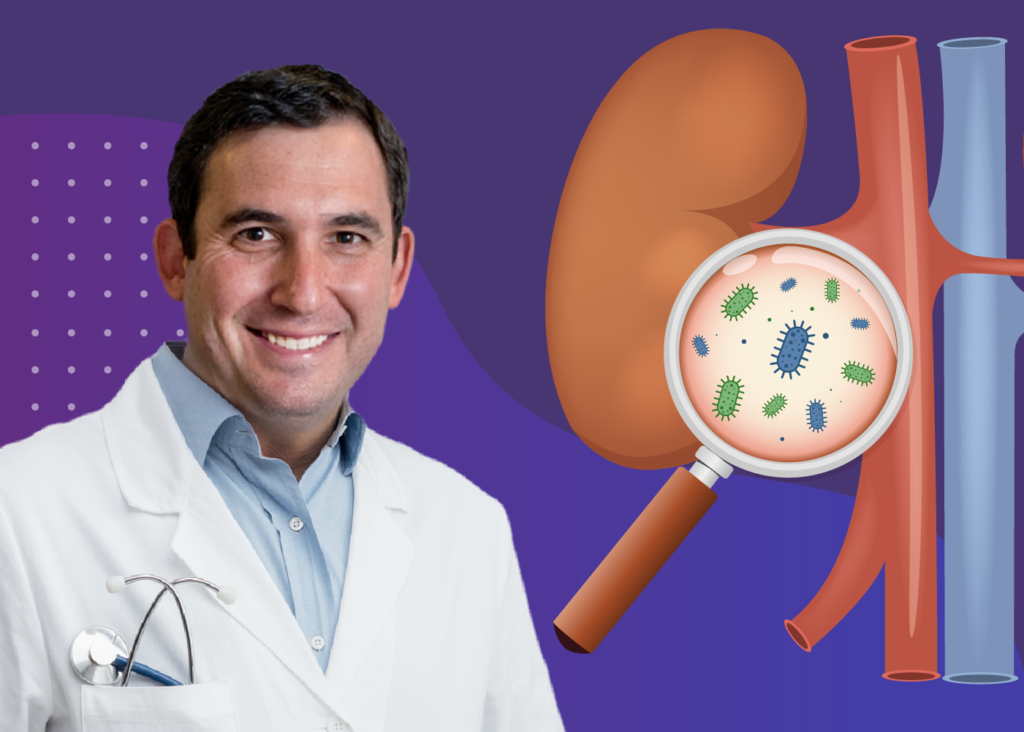No matter how many stones you’ve had, the thought of getting an infection after a kidney stone treatment can be scary. How can we manage them? Today, Dr. Brian Eisner, from Massachusetts General Hospital, explains all about post-treatment infections and what can be done to prevent them.
Could you tell us more about what post-treatment infections are and what causes them?
Any time a procedure or a piece of equipment is introduced into the body, there is a risk of starting up a urinary tract infection. This is in particular for more invasive treatments such as ureteroscopy (URS), which involves inserting a small telescope up the bladder, and percutaneous nephrolithotomy (PCNL), when we have to make a puncture through the flank. Additionally, when we break up a kidney stone, we can sometimes liberate the bacteria inside the stone. However, infections contracted after kidney stone treatments become bladder infections, which are minor and can be treated with oral antibiotics.
I’m planning to undergo a procedure for my stone – does this mean I’m likely to get an infection?
There are usually two types of kidney stone patients, and the likelihood of you getting an infection after kidney stone treatment would depend on which one you are.
The first type of patient does not have a history of urinary tract infections, and their risk of infection after treatment usually ranges from 3 percent to 5 percent. They are fairly easy to treat with a single dose of antibiotics in the operating room, which has been shown to be sufficient and safe.
The second type is patients who have a history of chronic recurrent infections. They tend to have bacteria colonizing their stones, resulting in recurrent urinary tract infections and kidney stones. The bacteria “hides” in pockets of the stone that are difficult to reach, so while oral antibiotics may sterilize their urine, it can be harder to sterilize a kidney stone.
It’s difficult to eradicate their infection without removing their stones, but when we operate on the stones, we also risk stirring up an infection. In such cases, we will suggest admitting them for a night. However, to err on the side of caution, we usually treat them both pre- and post-operatively with antibiotics for several days to sterilize their urine.
How do I know if I have an infection after my kidney stone treatment?
If you’re feeling unwell, take your temperature, and if you’re feverish, call us right away. A fever after surgery is usually a sign of a urinary tract infection, and we want to make sure it is treated with the appropriate antibiotics, either orally or intravenously. For patients who have never had an infection after kidney stone treatment before, we often give a prescription for oral antibiotics.
For patients who have had multiple infections in the past and may be at risk of more serious infections, we may change their antibiotic regimen, or even bring them in for intravenous antibiotics.
Is there anything I can do to decrease my chances of getting an infection after kidney stone treatment?
As a pre-emptive measure, patients are encouraged to stay hydrated. Kidney stones are formed from the crystallization of the urine – the more diluted the urine is, the fewer stones you make. A good gauge of whether you’re drinking enough water is to aim for a urine volume of about two and a half liters.
Post-treatment, staying hydrated helps to keep the urine flowing and clear up some of the bloody urine from the procedure. This is particularly important pre-procedure as well, because the more diluted the urine is, the more the patient passes urine, which will lessen their symptoms and allow them to recover from the infection much quicker.
If we’re able to identify the patients with a history of infection before surgery, we can pre-treat them to mitigate the risk of getting an infection. As urologists, we also ensure that we follow up with discharged patients and if they are feeling ill, that they come back to the hospital for further evaluation.
This interview has been edited for length and clarity.
Dr. Brian Eisner is the Co-Director of the Kidney Stone Program at Massachusetts General Hospital. He specializes in kidney stone surgery, kidney stone prevention, endourology and related research. He serves as the Medical Director of the Massachusetts General Hospital Department of Urology and the Chief of the Division of Urology at Newton Wellesley Hospital.
His clinical practice focuses on kidney stone prevention, minimally invasive and surgical treatments for kidney stones, and endourology. He is actively involved in research involving kidney stone prevention, risk factors for kidney stone disease and surgical treatment of kidney stones.





